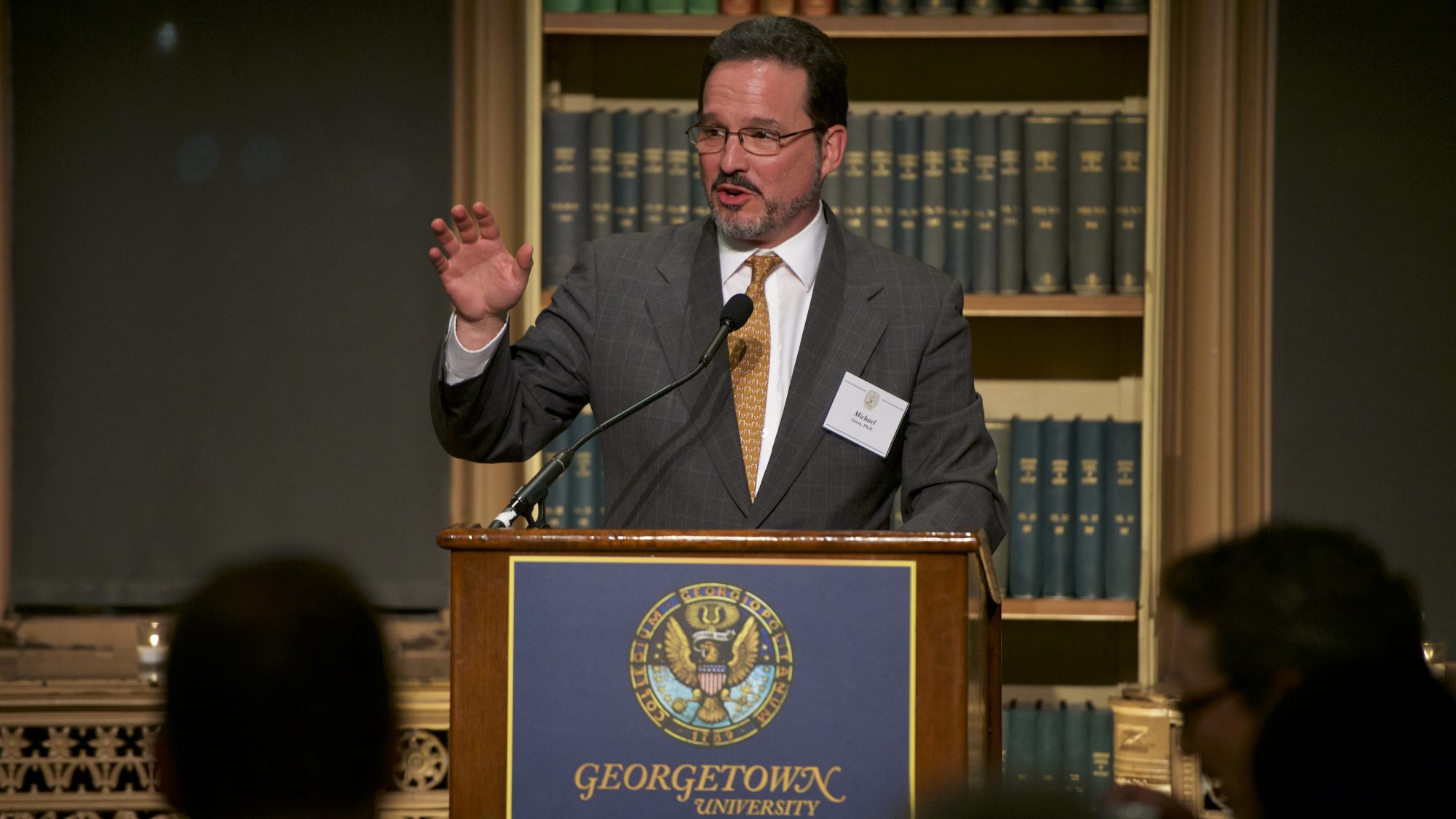Dr. Michael Green, Associate Professor of Asian Studies and Foreign Service, assumed the position of Director of the Asian Studies Program (ASP) in January 2018. Green has spent his academic career pursuing research in East Asian security and American grand strategy in the Asia-Pacific. He hopes to create new opportunities in research and scholarship for students, heighten the program’s level of intellectual rigor, and enhance the University’s commitment to engaging with the region.
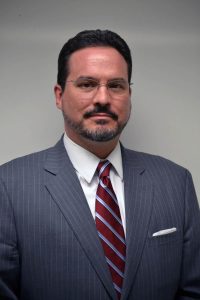
Green succeeds outgoing director Dr. Victor Cha, whose 10-year tenure at the helm of the program brought about the redesign of the undergraduate certificate and the creation of the Master’s program in Asian Studies. Green first joined the Georgetown faculty in 2006 after serving in the National Security Council of President George W. Bush. He hopes to continue building upon Cha’s vision of constructing a program that applies scholarship to solving the pressing challenges of the region.
“Victor Cha and I believe in the importance of the ability to synthesize scholarly approaches, understand culture and language, and apply those skills to solve problems in business and government through a theoretical, academic lens,” Green says. “We both worked in the National Security Council, so the fact that we share this view—how scholarship can retain its rigor while being made relevant to policy—is pretty unique.”
Green is a Washington, D.C. native whose mother served in the U.S. Embassy in Italy and whose father was a marine. He originally intended to join the Foreign Service, but instead pursued graduate-level work and professional engagements in Asia, subsequently leading to his position within the National Security Council, where he served as Special Assistant to President George W. Bush and Senior Director for Asian Affairs from 2004 and 2006. Working in the White House, Green learned about the importance of understanding the complexities of the region, and now hopes to transmit that knowledge to Asian Studies students.
“Being able to have in your head that complex, three-dimensional set of dynamics and yet able to boil it down to five, ten minutes was a skill I developed in the White House using all my social science training, policy experience and knowledge of Asia,” Green says. “It’s a skill that to some extent I think anybody who comes into our classroom could develop at a certain level and I thought ‘that’s a really important skill set, we need more and more Americans who can do that.’”
“Regional studies programs should not be just about explaining culture in another country or politics in another country. To be really valuable, you have to connect that to larger questions, whether it’s academic questions or business strategy or American strategy for the government.”
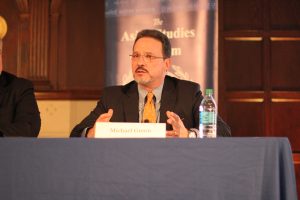
Asian Studies’ Rapid Growth
In 2006, when Green first arrived to Georgetown, Asian Studies existed only as a concentration for graduate students and a certificate for undergraduates. Following the recommendations of the Asian Studies Planning Committee (of which Green was a member), the undergraduate certificate was redesigned in 2008 and the graduate certificate was launched in 2009.
Shortly afterwards, ASP received the prestigious U.S. Department of Education Title VI grant and the Foreign Language and Area Studies (FLAS) fellowship. Faculty chairs for the study of China, Japan, India, and Korea were established for the creation of the M.A. in Asian Studies (MASIA) degree. According to Green, MASIA has since added three tenure-line faculty positions in five years, qualifying it as “tremendous growth.”
“In the past five years, we have quickly established our Master’s in Asian Studies (MASIA) degree as one of the top regional studies programs in the country, competing with a handful of peer schools for students,” Green says.
Green also highlights the composition of the Asian Studies faculty, a mixture of scholars and practitioners. He believes that students must not only learn the theory behind international relations, but also the role and application of these concepts in policy-making and business.
“We have anthropologists, historians, and political scientists who have done cutting-edge work in their own disciplines, and bring to the classroom the latest research and understanding of theory and methods that the students benefit from,” Green says. “But at the same time, we get practitioners who can explain what it’s like to negotiate a business deal with China, negotiate with the North Koreans, or what it’s like to be in a situation with the White House helping the president decide what to do about a crisis in Southeast Asia.”
“The students at Georgetown, particularly in the School of Foreign Service, like and deserve a mix of the highest levels of scholarship, rigorous methods and theory, and practical applications.”
Though he is proud of what Asian Studies has achieved so far, Green says that there is still work to do.
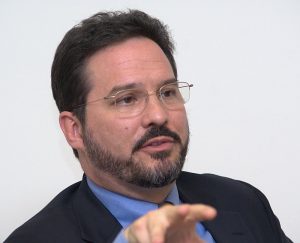
“We measure our success in terms of the quality of the students and then how successful they are when they graduate. And we’ve done very well but we think we can do even better,” Green says. “I think Georgetown is one of a handful of schools that uniquely attracts students who are completely dedicated to foreign service and learning languages. We’re getting the best of them, but we want to get even more of the best of them.”
“And if we have resources to take the internship programs we have and beef them up even more, it’d be a good thing for students at Georgetown, but it’d be a good thing for the country too. At the time when Asia is more important than ever, when global engagement is more important than ever, we need to be preparing students to succeed.”
Green’s Plans for Asian Studies
Green is confident that Asia’s role in international security and economics will continue to expand in the near future. He hopes that Asian Studies continues preparing students for understanding and facing the challenges that will emerge as a result.
“Asia is going to have a bigger impact on us, whether it’s foreign direct investment or security,” Green says. “The individual challenge our students will have is navigating this complex mix of economic opportunity and security challenges.”
He hopes to continue promoting a multidisciplinary approach that exposes students to the intersection of political, cultural and economic dynamics, in order for them to comprehend the region holistically and make an impact in their careers.
“We want to make sure they have the ability to understand these different domains because they may go into academia, but they need to understand how policymaking is done if they’re going to write about international relations,” Green says. “They may go into business, but they need to know political risk in Asia if they’re going to bring their Asia skills to a bank or a consulting firm.”
“Asia is a region where you have these contradictions of growing economic interdependence, spreading production networks and mutual foreign direct investment among countries that are actively arming to fight a war with each other if they have to,” Green adds. “It’s really hard to do business or diplomacy, like I said, if you don’t understand both sides of that complex and contradictory equation.”
Besides adding more faculty and expanding ASP’s curriculum, Green is also working towards the creation of a Center for Asian Studies in the near future. He believes that taking this step would allow ASP to promote even more opportunities for scholarship and better support students in reaching their academic and professional objectives.
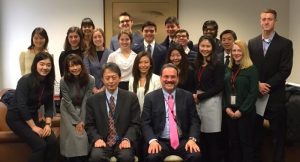
“The next stage would be to endow a Center for Asian Studies that would allow us to have a dedicated pool of resources, faculty, and staff to create even more opportunities than we have now,” Green says. “We have many opportunities—the students get stipends to do internships in the summer, for example. We also help them get positions in Asia or in Washington. But the next stage is to secure more resources to do more creative things, like spring break research trips to Asia and scholarships for one-credit courses.”
Green has set the Centennial of the School of Foreign Service in 2019-2020 as tentative date for the project.
“That is something I’m working on with the dean for the hundredth anniversary of the School of Foreign Service,” Green says. “We’ll see how it goes, but we’re working to bring it up to that next level.”
Engaging in the Classroom
Though his position limits the amount of time he can devote to teaching, Green hopes to continue making the most of the opportunities he has to engage with students in the classroom. Green enjoys teaching two courses in particular — one on Asian leaders and another on American foreign policy in the Asia-Pacific since 1783.
Green says that his course on Asian leaders gives students the unique opportunity to step into the shoes of the major actors in post-war Asia, and learn about the evolution of different countries in the region through their eyes.
“We take a deep dive on Asia’s post-war leaders to understand their impact and to look at how Asian international relations and Asian politics and society have changed through the prism of a leader, who really in many cases may have set their country, China or Korea or Japan or India, on the trajectory they’re on,” Green says.
His class on U.S. strategy goes a step forward, challenging students to recreate the political and economic conditions of the region across different eras beginning in 1783. Students assume the roles of leading U.S. politicians, diplomats and military officials engaging with the region.
“They have to replay, and write essays and role-play, what it was like to be Theodore Roosevelt or Commodore Perry in the 1850s and think through American approaches to this region in strategic terms but thinking about geography and values and the balance of power. It kind of gets their head wrapped around this sort of multidisciplinary approach.”
At the end of the course, students are expected to use their appreciation of the changes and continuities in Asia from 1783 to the present date to decide on the United States’ current approach to the region and its issues.
“You don’t do exactly what Commodore Matthew Perry recommended in 1853 because we have intercontinental ballistic missiles and jet fighters and the internet, he just had sailing ships and steamships,” Green says. “But the geography’s still a huge challenge, the Pacific is enormous, Japan, China, Korea all still have rivalries, some of it’s the same, some of it’s different.”
